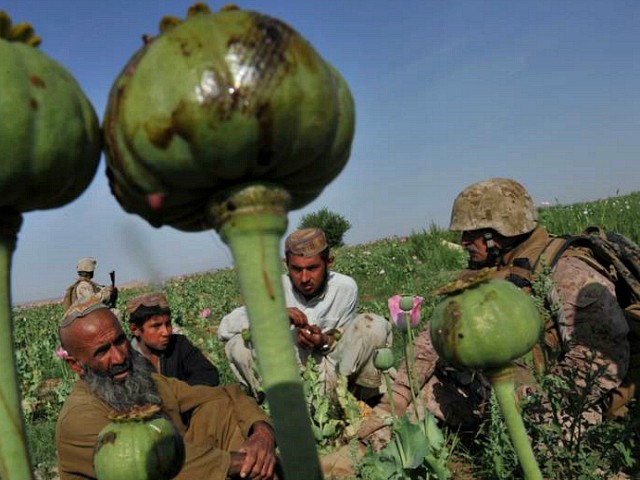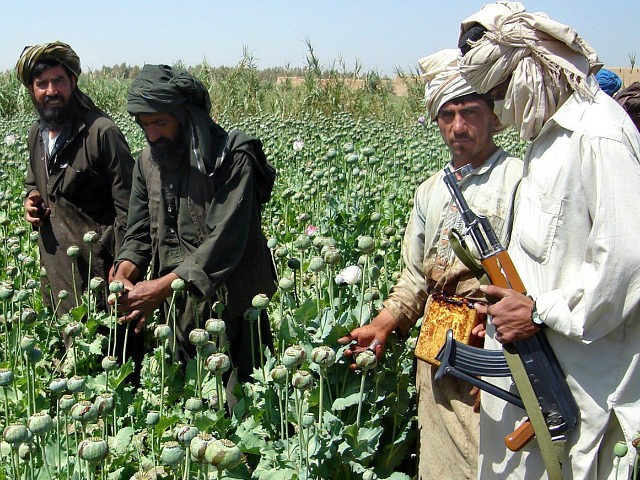The United Nations Office of Drugs and Crime (UNODC) published a report Tuesday that revealed, according to its estimates, Myanmar is now the world’s top producer of opium, dethroning longtime leader Afghanistan.
Afghanistan has maintained a reputation as a global hub for opium, heroin, and other opioid drugs for decades, largely as a result of the Taliban cultivating poppy to fund its war against America and the former Afghan government doing little to contain the opium trade. Poppy is one of the most lucrative crops in Afghanistan, leading impoverished farmers to use their land to grow the plant used to produce opium.
The Taliban terrorist organization seized control of the country in August 2021, ousting the American-backed government, and claimed it would make Afghanistan “narcotics free.” In 2022, Taliban jihadists announced a ban on poppy cultivation that initially led to a documented boom in production, but according to the UNODC report published on Tuesday, it has since resulted in a 95-percent decline in 2023 production estimates. In addition to banning poppy cultivation, the Taliban launched a campaign to abduct heroin addicts and force them into brutal “rehabilitation” centers in which they were reportedly deprived of the drug abruptly, a dangerous and potentially deadly practice for addicts.
Tuesday’s UNODC report focused largely on neighboring Myanmar and Laos. Myanmar, in particular, the United Nations documented, has seen a dramatic increase in opium production following the 2021 military coup. The increase in production, UNODC stated, is partially a result of the industry in the country becoming “increasingly sophisticated,” moving away from the model of small family farms.
“Sowing poppy in densely organized plots and use of other inputs, such as irrigation systems, and sometimes fertilizers, have recently boosted plot yields and total production estimates to historic levels,” the report detailed.
“Following several years of decline between 2014 and 2020, poppy cultivation in Myanmar reached a low of 29,500 hectares in 2020,” the organization explained:
While the trend ended in 2021 with a slight increase from the year before, the 2022 growing season – the first one following the military takeover in February 2021 – saw a large increase of about 33%, with cultivation estimates reaching just over 40,000 hectares.
Speaking to Voice of America, UNODC Regional Representative Jeremy Douglas said on Tuesday that “the instability and lack of security in Myanmar have caused really significant economic turmoil the past couple of years, resulting in people turning to other ways to make money.”
“So, essentially, people that had options before, when the economy was doing comparatively well, are going back to opium production,” he explained. “It’s basically an income earner for them when they have few or no other options.”
Myanmar is currently seeing its highest opium production since 2001. The country reportedly produced 1,080 tons of opium in 2023, which the BBC noted was “far ahead of the 330 tonnes Afghanistan reportedly produced.”
The United Nations attributed the decline in production in Afghanistan to the Taliban’s cultivation ban.

Rudy Ayala (R), a law enforcement professional embedded with the Marine Corps, questions opium poppy farmer Abdul Manan (L) and his two sons, Hastihan (R2) and Muhammad Bayan (L2), at Maranjan village in Helmand province, Afghanistan, on April 25, 2011. (BAY ISMOYO/AFP/Getty Images)
“In 2022, the de facto authority in Afghanistan reimposed a strict ban on poppy cultivation and opium production, resulting in a 95% decline in production estimates in 2023,” the report stated. The United Nations refuses to accept the Taliban as the formal government of Afghanistan, instead referring to it as the “de facto authority.”
“This development, if sustained, could result in global shortages of opiates, including heroin, given Afghanistan’s historically dominant role in illegal production of opium,” the UNODC report continued. “A global shortage in opiates, including heroin, could result in upward pressure on the price of opium in the region, which would likely encourage more cultivation and production from Southeast Asia.”
In the Taliban’s first press conference following the fall of Kabul, spokesman Zabihullah Mujahid insisted that the terrorists would eradicate the drug trade.
“From now on, Afghanistan will be a narcotics-free country,” Mujahid proclaimed. He later added, “We are assuring our countrymen and women and the international community that Afghanistan will not produce any kind of narcotics.”
At the time, Afghanistan was responsible for “more than 80 percent of global morphine and heroin” seized by police each year, according to UNODC, and the Taliban itself was part of the reason why.
“The Taliban have counted on the Afghan opium trade as one of their main sources of income,” Cesar Gudes, the head of UNODC’s Kabul office, told Reuters in August 2021.
The Taliban took over half a year to officially ban opium production in April 2022, which reportedly led to a slight increase in production before a decline. By November 2023, UNODC documented a 95 percent drop in opium in the country. Many farms switched to growing wheat, the United Nations reported, but wheat crops are far cheaper than opium, and the abrupt shift could lead to an increase in poverty rates in what is already one of the world’s poorest nations.

COMMENTS
Please let us know if you're having issues with commenting.